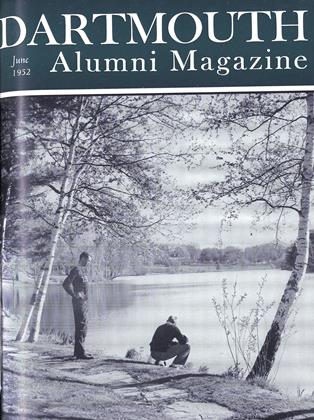THE other day Al Reich '52 received the Barrett Cup, the award that is made each year to "the outstanding member of the senior class." Why did he deserve it what makes him stand out from a group of pretty fine fellows?
He didn't receive the honor because he is president of the senior class, or because of his football or the fact that he is an All-American javelin thrower. He wasn't voted the cup because he is the president of his fraternity (Beta) or because he is an honor student in Russian Civilization or for his service to the College in helping to form the proposed honor system.
He stands out because of the way in which he participated the direct, honest way in which he plunged right to the center of all these activities made him outstanding among 562 others. Many of his classmates have more all- round ability than Al. He is not a natural athlete, nor is he a born scholar, but he more than makes up for it. His own tremendous drive and sometimes startling sense of responsibility force him to play over his head. Whenever he feels that he is pushing the limits of his ability, he gets a second wind that sets him out in front of the group. And once in the lead, his personal modesty and charm (he will hate this) evoke admiration from everyone. At Dartmouth his admirers range from freshman heelers on the practice field to the President of the College.
Take his football career, for instance: As a freshman, just returned from England where he had spent a year after graduating from the Loomis School in Windsor, Conn., he was not much of a football player. He made the "B" team but was not good enough to be taken on trips. In his sophomore year he played J.V. all season and Tuss told him, frankly, that he just wasn't enough of a prospect to be invited back for early fall practice. But a vacancy developed and he was invited—as the man at the very bottom of the list. A month from i then the public address system at Memorial Field announced that the starting right halfback, unlisted on the program, was Alan Reich '52. Later, some newspapers billed him as the sensational English boy who had never played football before entering Dartmouth. His friends at home in Pearl River, N.Y., were amused.
Al grew up with his brother Pete, captain-elect of Dartmouth's 1952 football team, in Pearl River where his father is an executive in a manufacturing firm. The boys played football together, starting at Loomis, and Mr. and Mrs. Reich have not missed a game in the last seven years including the Michigan game at Ann Arbor.
Although Al has majored in Russian at Dartmouth, he has no special aptitude for it. In fact, the instructor in his first Russian language course, noting his difficulty in translation, suggested that he wasn't suited for the work. Now, at graduation, he has a remarkable command of the language. His teachers speak of him as the top student of the Russian language at Dartmouth.
Al speaks enthusiastically about a number of his professors at Dartmouth but the one who has helped him most he says is an instructor in the Department of Russian Civilization, Mrs. Nadtzhda Koroton. Mrs. Koroton left Russia in 1944 with her daughter, who has since graduated from the University of Michigan, and now devotes all of her time, frequently well into the evening, to the teaching of Russian at Dartmouth. Mrs. Koroton and Al have a fine respect for each other that increases the intensity of their work - Al once mailed an assignment to her while on a football trip at Yale.
Next year A1 will continue his Rus- sian studies at Oxford on a Reynolds Fellowship. After that he will probably go into Army Intelligence and then— well, he doesn't know. He isn't sure what he will do; perhaps it will be for- eign service work. In any event, no mat- ter what he chooses, we'll bet on him — he's got the stuff.
ALAN REICH '52, Barrett Cup winner, with Prof. Hewette E. Joyce, senior class adviser.
 View Full Issue
View Full Issue
More From This Issue
-
 Article
ArticleDeaths
June 1952 -
 Class Notes
Class Notes1918
June 1952 By ERNEST H. EARLEY, DONALD L. BARR, RICHARD A. HOLTON -
 Article
ArticleThe Cold War and Liberal Education To a Father From a Dean
June 1952 By STEARNS MORSE -
 Class Notes
Class Notes1929
June 1952 By F. WILLIAM ANDRES, EDWIN C. CHINLUND, GEORGE B. REDDING -
 Class Notes
Class Notes1926
June 1952 By HERBERT H. HARWOOD, H. DONALD NORSTRAND, ANDREW J. O'CONNOR -
 Article
ArticleThe Undergraduate Chair
June 1952 By CONRAD S. CARSTENS '52













